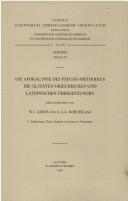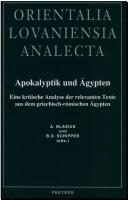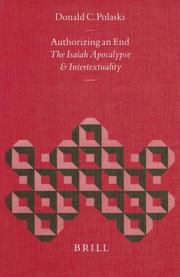| Listing 1 - 10 of 103 | << page >> |
Sort by
|
Book
ISBN: 1498532403 0739183834 9780739183830 1306094313 9781306094313 9780739183823 0739183826 9781498532402 Year: 2013 Publisher: Lanham
Abstract | Keywords | Export | Availability | Bookmark
 Loading...
Loading...Choose an application
- Reference Manager
- EndNote
- RefWorks (Direct export to RefWorks)
Thinking Dead: What the Zombie Apocalypse Means, edited by Murali Balaji, examines various aspects of the zombie apocalypse scenario from the perspective of a variety of theoretical frameworks. Essays in the collection shed light on why we are so obsessed with the undead. This is a cutting-edge volume for the growing scholarship on media representations of zombies.
Apocalyptic literature. --- Zombies --- Zombies. --- Zombis --- Dead --- Literature, Apocalyptic --- Literature --- History.
Book
ISBN: 9004272046 9789004272040 9789004272033 9004272038 1322514739 Year: 2014 Publisher: Leiden Boston
Abstract | Keywords | Export | Availability | Bookmark
 Loading...
Loading...Choose an application
- Reference Manager
- EndNote
- RefWorks (Direct export to RefWorks)
A collection of twenty-one essays clustered around the theme of apocalyptic—revelations of hitherto undisclosed divine mysteries to human seers, either directly or through the mediation of an interpreting angel. Preliminary essays on the Book of Job, Messianism, and apocalyptic ethics are followed by five studies centred upon Jewish apocalypses composed around the turn of the era, two anonymous, three pseudonymous, and four essays on New Testament writers, two on Paul, one on Mark, and one on John. A reflection upon an early Islamic convert from Judaism, emphasizing the ‘Abrahamic-lexicon’ common to all three religions of the book, is succeeded by essays on two medieval Christian visionaries, Joachim of Fiore and Francis of Assisi. After a further essay on a little known Syriac apocalyptic text the volume concludes with studies of four different aspects of the Book of Revelation itself.
Apocalyptic literature. --- Literature, Apocalyptic --- Literature --- Bible --- Criticism, interpretation, etc.
Book
ISBN: 9783506764904 350676490X 3657764909 9783657764907 Year: 2011 Publisher: Paderborn Ferdinand Schöningh
Abstract | Keywords | Export | Availability | Bookmark
 Loading...
Loading...Choose an application
- Reference Manager
- EndNote
- RefWorks (Direct export to RefWorks)
Flammendes Inferno, einstürzende Hochhäuser, verzweifelte Menschen – Panik, wohin das Auge reicht. So gestalten sich in unserem Kulturkreis die vorherrschenden Assoziationen zum Begriff der 'Apokalyptik'. Mit dem biblisch-christlichen Verständnis dieses Phänomens hat eine derartige Weltuntergangsstimmung wenig bis gar nichts zu tun: Kein Angstgebilde, sondern ein Hoffnungsgemälde, ein Zeitgefühl mit Perspektive eben eröffnet sich in christlichem Horizont. Vorliegender Band fokussiert das Phänomen ›Apokalyptik‹ zunächst aus politologischer, soziologischer und mentalitätsgeschichtlicher Perspektive. Dabei stellt sich heraus, in welch ungeheurem Ausmaß moderne Apokalyptik als bloßes Säkularisat jede Hoffnung auf einen Neuanfang längst verabschiedet hat.
Religious studies --- Christian dogmatics --- Apocalyptic literature --- Eschatology --- Literature, Apocalyptic --- Literature
Book
ISBN: 3534060261 9783534060269 Year: 1982 Volume: 365 Publisher: Darmstadt Wissenschaftliche Buchgesellschaft
Abstract | Keywords | Export | Availability | Bookmark
 Loading...
Loading...Choose an application
- Reference Manager
- EndNote
- RefWorks (Direct export to RefWorks)
Bible --- Apocalyptic literature --- Apocalyptische literatuur --- Literature [Apocalyptic ] --- Literatuur [Apocalyptische ] --- Littérature apocalyptique --- #GROL:SEMI-228

ISBN: 9042900105 9042900113 9789042900110 9789042900103 Year: 1998 Volume: 569-570 97-98 Publisher: Lovanii: Peeters,
Abstract | Keywords | Export | Availability | Bookmark
 Loading...
Loading...Choose an application
- Reference Manager
- EndNote
- RefWorks (Direct export to RefWorks)
Christendom --- Christianisme --- Apocalyptic literature --- Academic collection --- Literature, Apocalyptic --- Literature --- Apocalyptic literature.
Book
ISBN: 9068315501 906831551X 2877231135 2877231143 9789068315509 9789068315516 9782877231138 9782877231145 Year: 1993 Volume: 540-541 220-221 Publisher: Lovanii : E. Peeters,
Abstract | Keywords | Export | Availability | Bookmark
 Loading...
Loading...Choose an application
- Reference Manager
- EndNote
- RefWorks (Direct export to RefWorks)
Apocalyptic literature --- Academic collection --- Literature, Apocalyptic --- Literature --- Apocalyptic literature. --- Godsdiensten --- Religions
Book
ISBN: 8839404465 9788839404466 Year: 1990 Volume: 55 Publisher: Brescia Paideia
Abstract | Keywords | Export | Availability | Bookmark
 Loading...
Loading...Choose an application
- Reference Manager
- EndNote
- RefWorks (Direct export to RefWorks)
Apocalyptic literature --- History and criticism. --- 296*64 --- -Literature, Apocalyptic --- Literature --- Joods messianisme en apocalyptiek --- History and criticism --- -Joods messianisme en apocalyptiek --- 296*64 Joods messianisme en apocalyptiek --- -296*64 Joods messianisme en apocalyptiek --- Literature, Apocalyptic --- Apocalyptic literature - History and criticism.
Book
ISBN: 9780800662967 Year: 2010 Publisher: Minneapolis Fortress
Abstract | Keywords | Export | Availability | Bookmark
 Loading...
Loading...Choose an application
- Reference Manager
- EndNote
- RefWorks (Direct export to RefWorks)

ISBN: 9042911131 2877236250 9789042911130 Year: 2002 Volume: 107 Publisher: Leuven : Editions Peeters,
Abstract | Keywords | Export | Availability | Bookmark
 Loading...
Loading...Choose an application
- Reference Manager
- EndNote
- RefWorks (Direct export to RefWorks)
Egyptian literature --- Apocalyptic literature --- History and criticism --- Congresses. --- Academic collection --- Ancient Egyptian literature --- Literature, Apocalyptic --- Literature --- Egyptian literature - History and criticism - Congresses. --- Apocalyptic literature - History and criticism - Congresses.

ISBN: 9004116079 9004498028 9789004116078 9789004498020 Year: 2000 Volume: 50 Publisher: Leiden; Boston : BRILL
Abstract | Keywords | Export | Availability | Bookmark
 Loading...
Loading...Choose an application
- Reference Manager
- EndNote
- RefWorks (Direct export to RefWorks)
Breaking with common views on Jewish proto-apocalyptic literature, in a postmodern manner, this work approaches one particular proto-apocalyptic text, Isaiah 24-27, the so-called "Isaiah Apocalypse", intertextually. This reading finds that the Isaiah Apocalypse redeploys and controls other texts, helping secure the authority of those texts as well as its own vision of the end. The first chapter surveys approaches to late Israelite prophecy and presents a new "intertextual" way of viewing this material. The chapters that follow investigate the "eternal covenant" and its role in intertextual space; Isaiah 25's construal of Israel's relationship to other nations; the central role of the "righteous" in Isaiah 26; and Isaiah 27, which points towards the victory of YHWH's order over chaos. Readers interested in the development of Jewish apocalyptic literature, the social arrangements of second-Temple Judaism, and postmodern treatments of biblical texts will find this volume useful.
Apocalyptic literature --- History and criticism --- 224.2 --- -Literature, Apocalyptic --- Literature --- Jesaja. Isaias --- -Jesaja. Isaias --- Bible. --- Criticism, interpretation, etc. --- Apocalyptic literature - History and criticism --- End of time
| Listing 1 - 10 of 103 | << page >> |
Sort by
|

 Search
Search Feedback
Feedback About UniCat
About UniCat  Help
Help News
News